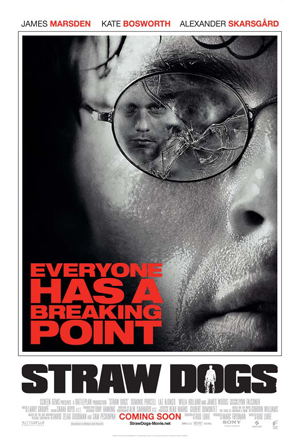Straw Dogs ***
 The British 1971 original by Sam Peckinpah both appalled and enthralled an unsuspecting audience, like an unwanted mirror held up to reflect some of the most primitive and raw human nature ever captured on screen when the chips are down. There was a distinct difference between the act of rape as one of empowerment, as opposed to sexual. Flash forward 40 years and set in the Deep South of the USA, the main characters are all the same – even the film’s poster image, with writer-director Rod Lurie’s 2011 version merely updating the setting and fashions but sticking close to the original script.
The British 1971 original by Sam Peckinpah both appalled and enthralled an unsuspecting audience, like an unwanted mirror held up to reflect some of the most primitive and raw human nature ever captured on screen when the chips are down. There was a distinct difference between the act of rape as one of empowerment, as opposed to sexual. Flash forward 40 years and set in the Deep South of the USA, the main characters are all the same – even the film’s poster image, with writer-director Rod Lurie’s 2011 version merely updating the setting and fashions but sticking close to the original script.
David and Amy Sumner (James Marsden and Kate Bosworth), a Hollywood screenwriter and his actress wife, return to her small hometown in the Deep South to prepare the family home for sale after her father’s death. Once there, tensions build in their marriage and old conflicts re-emerge with the locals, including Amy’s ex-boyfriend Charlie (Alexander Skarsgård), leading to a violent confrontation.
The ‘town verses country’ contradiction has always been fertile ground for such horror movies, even spurning the remake of another all-time classic shocker last year, I Spit On Your Grave that also involves deeply disturbing rape scenes. However, in the latest Straw Dogs, there is just one graphic scene and it’s edited to minimise any upset. This may spare some people’s sensitivities, but it seems to work against its favour and blunt any impact. By almost diluting what unfolds, Lurie does not give us enough information to gauge our disgust – even if he sticks to the ‘she’s-asking-for-it’ misogyny of the original film, with Amy undressing at the window as a symbol of her sexual confidence as the men work on the barn roof.
The other spoiler for many True Blood fans is the striking presence and rough handling by Swede actor Skarsgård as Amy’s redneck former beau Charlie. After the confrontational vampire scenes in the TV series, our ‘fear’ of Skarsgård as Charlie’s stalking and subsequent abuse of Amy is somewhat diffused in this: When we should be appalled by the act, there is a disturbing titillation at play that excites rather than sickens, even with Amy’s first uttering of the word “no” that should suffice. It could be argued that this is the quandary the film poses – rape after all usually happens between two people who know each other, but it does nothing to shame us, or appease the tireless work of some victims’ charities. The fact is Skarsgård taps into his alluring trademark calm and restrained persona – with a few gratuitous torso shots to boot, making us throw all caution to the wind. Is this smart casting by Lurie to really test our resolve, or miscasting, as Lurie’s Charlie does not quite fit the fiend he should be?
In fact, the most shocking act of aggression in the 2011 film is that carried out by James Woods’ character Tom Heddon – known as ‘Coach’ in this that allows us to appreciate American’s obsession with success and football prowess, and capture the impression of those has-beens cast aside, such as Charlie and his boys, who are still in awe of him. Woods as Heddon is the same character trying to get at the Niles boy in the new film, but he is more unpredictable and threatening than his British counterpart, Peter Vaughan, was back in 1971, and often steals the scenes with all involved.
Marsden and Bosworth have the same believable chemistry as Hoffman and George did in the original, with both adding that contemporary arrogance and resolute independence that present-day audiences can relate to – down to the question of the purpose of religion. Marsden stands out in a more serious, adult role this time than his usual family-friendly affair. But his childishness suits David’s carefree spirit in this, making it one of his best performances to date.
As close to the original as Lurie’s well-made remake is, there remains a sizeable question mark over why Straw Dogs was revisited at all. Purely to make the 1971 film’s ideas accessible to a 2011 audience seems a flimsy excuse, and it merely perpetuates a dangerously caviller and sexist attitude in contemporary cinema. Perhaps it’s up to the maturity of the audience watching to decide, but that is both the solution and the risk of such a controversial subject matter.
3/5 stars
By @FilmGazer
**WATCH THE TRAILER HERE